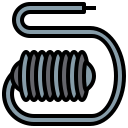Manufacturing
Process Flow

Raw Material Procurement
Source high-quality raw materials like conductors (copper, aluminum), insulation materials (PVC, XLPE) and jacketing materials (PVC, nylon) from approved vendors with documented quality control procedures. Conduct thorough inspections upon arrival to ensure material specifications and certifications are met.

Design and Engineering
Utilize sophisticated design software to create cable specifications based on customer requirements and industry standards. Consider factors like voltage rating, current carrying capacity, operating temperature, and environmental conditions.

Conductor Preparation
Depending on the cable type, conductors may undergo processes like annealing (softening) or drawing (reducing diameter) to achieve desired properties. Implement strict quality control measures to ensure conductor size, cleanliness, and freedom from defects.

Insulation
Apply the chosen insulation and jacketing materials onto the conductor(s) using extrusion lines. Precisely control temperature, pressure and extrusion speed for uniform application and consistent thickness. Conduct in-line inspections using automated systems or visual checks to detect any flaws in the insulation or sheath.

Cabling and Stranding
For multi-conductor cables, individual insulated conductors are twisted or stranded together to form a core. Precise control of lay length (twist pitch) is crucial for flexibility, electrical performance and signal integrity.

Outer Sheathing
Apply the final outer jacket for overall protection from mechanical damage, environmental factors and UV radiation
Quality Control
Raw Material Inspection
All incoming materials are meticulously tested to ensure they meet our stringent specifications. We source materials only from trusted suppliers who adhere to global quality standards.
In-Process Quality Checks
Throughout the manufacturing process, we conduct continuous monitoring to identify and address any deviations. Automated testing equipment ensures consistency and precision in extrusion, braiding, and insulation processes.
Advanced Testing Facilities
Our state-of-the-art testing labs are equipped to perform electrical, mechanical, and environmental tests.
Tests include:
Dielectric Strength Testing
Ensures insulation integrity under high voltage.
Tensile Strength Testing
Verifies the mechanical durability of the cables.
Flame Retardant Testing
Confirms compliance with fire safety standards.
Final Product Inspection
Each cable undergoes a rigorous final inspection before packaging and dispatch. Our quality assurance team checks for dimensions, electrical performance, and overall finish to ensure every product meets customer requirements.
Printing and Labeling
Print necessary information on the cable jacket, such as the manufacturer's name, cable type, voltage rating and size. Ensure clear and durable printing that adheres to industry standards and customer specifications.
Coiling and Packaging
Carefully spool or reel the finished cable onto drums or reels of appropriate size and strength. Securely package the cable with protective materials to prevent damage during storage or transportation
Warehousing and Distribution
Continuous Improvement
Housecab Solutions Pvt. Ltd. strives for continuous development in their manufacturing processes. This can involve:Investing in technological advancements like automation, robotics, and real-time process monitoring.
Regularly reviewing and updating quality control procedures to identify and address potential issues
Conducting research and development to explore new materials and innovative cable designs.
Implementing employee training programs to ensure a skilled and knowledgeable workforce.
